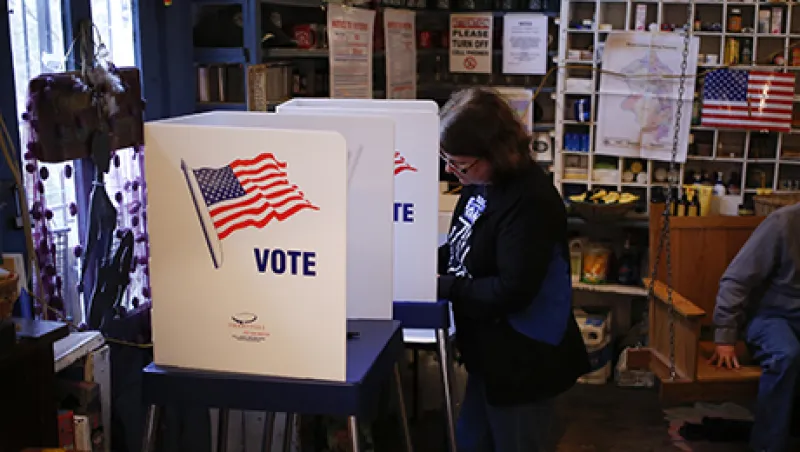Last week pensions proved to be electoral issues, either directly or indirectly, in a number of states and municipalities across the U.S. The results were mixed. In the same way voters sent a conflicted message when a handful of majority-Republican states — Alaska, Arkansas, Nevada and South Dakota — voted to raise the minimum wage, so too did their views on defined-benefit-pension reform prove to be complex.
As a general rule, when the pension debate was framed as a budget and financial issue, reformers were able to gain the upper hand. When the debate was framed as a health and safety issue, or more broadly around threats to education, then the defined benefit camp usually won. Here is a roundup of the most important races and results for defined benefit pensions:
Phoenix: ballot initiative. Proposition 487, defeated.
This was the biggest win of the midterm elections for defined-benefit-pension defenders. The initiative on the ballot in Phoenix would have halted defined benefit pensions for new public employees and switched them to a 401(k) system. Even though the language of the initiative sought to specifically exclude public safety workers, firefighters and police were concerned the proposal would affect their benefits. They pushed hard to see that Proposition 487 was defeated, fighting against outside money in the form of 501(c)(4) political contributions. In the end, 57 percent of Phoenix voters said no to pension reform.
Rhode Island: governor. Gina Raimondo, winner.
As general treasurer of Rhode Island, Gina Raimondo successfully championed pension reform, resulting in the 2012 passage of the Rhode Island Retirement Security Act by the state legislature. But she did so over strong objections by union beneficiaries, and her reforms are now being challenged in the courts. When Raimondo announced she was running for governor, with incumbent Lincoln Chafee deciding not to serve a second term, the question became whether a pension reformer could successfully win both a Democratic primary and higher office. The answer turned out to be yes, but it was close.Raimondo was able to win with 42 percent of the votes in the primary, where her two challengers split the progressive vote. In the general election, union critics threatened to vote for the Republican candidate, but Raimondo won with 40 percent of the vote, defeating Republican Allan Fung, who got 36 percent, and progressive candidate Bob Healey, who got 22 percent. (Fun fact that has nothing to do with pensions: Raimondo will be staying in her own home during her tenure as governor. Rhode Island is one of three states without a governor’s mansion.)
Pennsylvania: governor. Tom Wolf, winner.
Pensions were not the only reason Pennsylvania voters rejected one-term governor Tom Corbett, a Republican, but the issue was a contributing factor. Corbett tried and failed to get defined-benefit-pension reform through the legislature. Tom Wolf, a Democrat and former businessman who beat Corbett 55 percent to 45 percent, said he wouldn’t cut worker benefits. Wolf’s pension-friendly views could set up a confrontation with the state’s Republican majority in the state legislature, which has been working on various pension reform proposals.
Illinois: governor. Bruce Rauner, winner.
Pension reform in Illinois is currently in limbo as the state awaits the outcome of a court challenge. If the state superior court strikes down the Illinois pension reform effort that Governor Pat Quinn, a Democrat, signed into law late last year, then it is back to the drawing board. Bruce Rauner, a former private equity executive and Republican who defeated Quinn, 51 percent to 46 percent, becoming the first GOP governor of Illinois since 2003, has promised to be more aggressive on pensions than Quinn. He will have the backing of the state’s pro-business groups, but not necessarily the Democratic state legislature.
San Jose, California: mayor. Sam Liccardo, winner.
This race was only called Monday, when Santa Clara County Supervisor Dave Cortese finally conceded to Sam Liccardo, San Jose city councilman. Both are Democrats. Liccardo was the pro-pension-reform candidate, whereas Cortese was favored by the unions and was fighting to increase funding for fire and police. The count: Liccardo won by 3,500 votes and 51 percent of the votes cast, with a few thousand ballots still outstanding.At first glance the result in San Jose would seem to contradict the idea that pension reform is harder to win when the debate becomes one about public safety. But the tight nature of the San Jose race speaks directly to that point. Liccardo was running on a promise of continuing to uphold pension reform measures that had been championed by incumbent mayor Chuck Reed, who could not run this time. In June 2012 San Jose had voted for Reed’s pension reform measures 69 percent to 31 percent.
The backlash against reform, however, was strong. The police in particular argued that the inability to provide attractive benefits was causing attrition on the force and among new recruits. As with pension reforms elsewhere, Reed’s ballot measure is being challenged in the courts. Now, after his narrow win, Liccardo has pledged to defend Reed’s pension legacy.
Get more on pensions .
Follow Imogen Rose-Smith on Twitter at @imogennyc .






